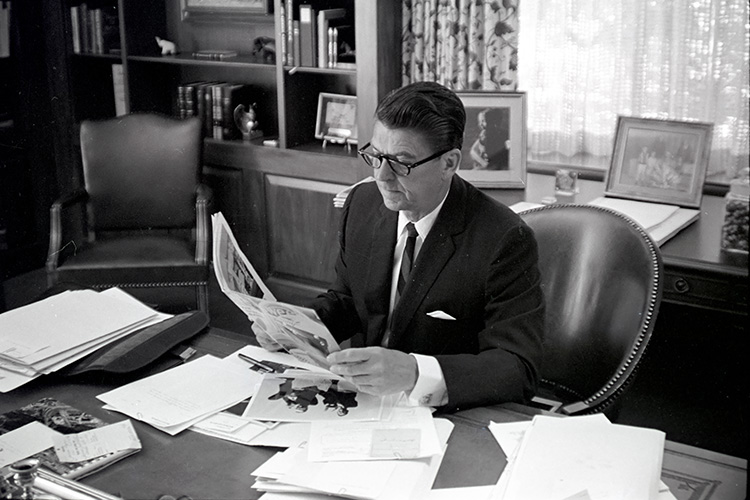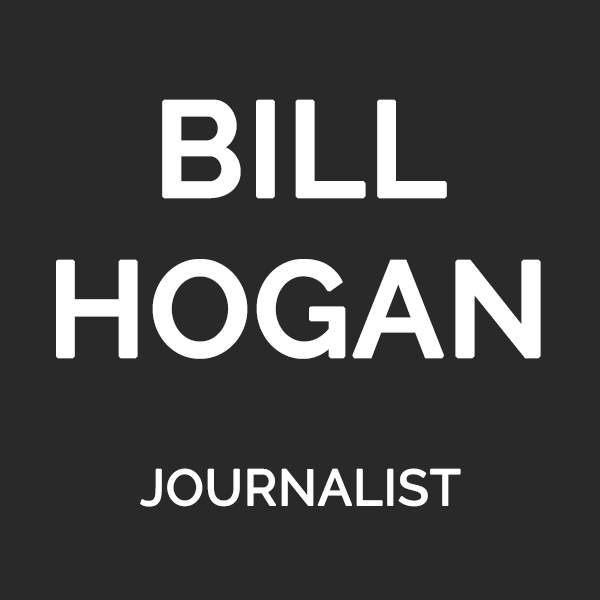
What Reagan Reads
By 6:30 a.m. each morning, President Jimmy Carter had finished reading the New York Times, Washington Post, Washington Star, Atlanta Constitution, and Atlanta Journal. President Reagan is not getting to the newspapers on his Oval Office desk that early, but he has one fewer to read — the two Atlanta papers have been replaced by the Los Angeles Times.
“He’s a voracious reader of newspapers and magazines,” says Time‘s Laurence Barrett. “You make some refueling stop somewhere and he wants the local paper from wherever you are brought in. He’ll thumb through them from beginning to end.”
Conservative magazines and journals are at the top of Reagan’s reading list, including Human Events, National Review, Commentary, Reader’s Digest, and Policy Review (a quarterly journal published by the Heritage Foundation, a conservative think tank), among others. But reporters and associates say Human Events was his unabashed favorite. “Reagan would always stick the latest copy into his briefcase before taking a trip,” says Peter Hannaford, a longtime Reagan associate and now a speechwriter and public-relations specialist. “He’d read it on the plane, pick up some new ideas, and they would find their way into a speech.” But on the campaign trail, the conservative tabloid sometimes inadvertently got Reagan into trouble. “Several times when he was challenged on facts,” says Knight-Ridder’s David Hoffman, “it turned out he had read them in Human Events.”
Reagan also reads the three weekly news magazines — Time, Newsweek, and U.S. News & World Report — and often looks through opinion journals, including The New Republic, Foreign Policy, and Foreign Affairs.
According to Hedley Donovan, a former editor-in-chief of Time Inc. and, until August 1980, a senior adviser to President Carter, Reagan’s White House predecessor didn’t spend much time with the business press. But Reagan is a heavy and regular reader of business publications, says Hannaford, including Business Week, Forbes, Fortune, and the Wall Street Journal.
Reagan’s reading habits are not confined to serious stuff. “I know Reagan likes to read the funnies,” says Gary Schuster, Washington bureau chief of the Detroit News. “He was going crazy to find the funnies over at the Blair House on the night of the inaugural gala — he had missed them that morning, so he went all over the place trying to find them.” And Reagan does not seem to mind comics that lampoon him — he was an avid follower of Garry Trudeau’s “Doonsbury” series on Reagan’s brain.
“He is something of an astrology nut, and he reads the horoscope columns,” says Richard Bergholz of the Los Angeles Times. “And he follows sports fairly well. His staff will clip out stuff they think he ought to read, and he will go through it.”
John Sears, Reagan’s former campaign manager, recalls that it was foreign affairs adviser Richard V. Allen who showed Reagan, then campaigning for the GOP nomination, an article by Jeane Kirkpatrick in the November 1979 issue of Commentary. Kirkpatrick, then a political science professor at Georgetown University and a resident scholar at the American Enterprise Institute, took aim at the Carter administration’s foreign policy, delivering a sharp indictment of its stand on human rights. Reagan, impressed by what he read, invited the author to join his foreign affairs advisory committee, and after his election appointed her ambassador to the United Nations.
It’s not likely that Ronald Reagan will ever cancel a White House newspaper subscription, as President John Kennedy did when he became angry at the editors of the New York Herald-Tribune. When Reagan was governor of California, the Washington Post‘s Lou Cannon recalls, the Sacramento Bee launched an editorial campaign critical of his administration. “Something really irritated Nancy,” he says, “and she wanted to cancel the subscription. So Reagan let her cancel the subscription at home, and he took the paper at the office. I remember him being very pleased when he told me that. It was like the husband who had solved the insoluble problem: he got to read his paper and he kept his wife happy, too.”
Main Story: Ronald Reagan’s Close Encounters With the Fourth Estate
This article originally appeared in the March 1981 issue of Washington Journalism Review.
Gary Schuster Laurence Barrett Lou Cannon Richard Bergholz Ronald Reagan Washington Journalism Review
